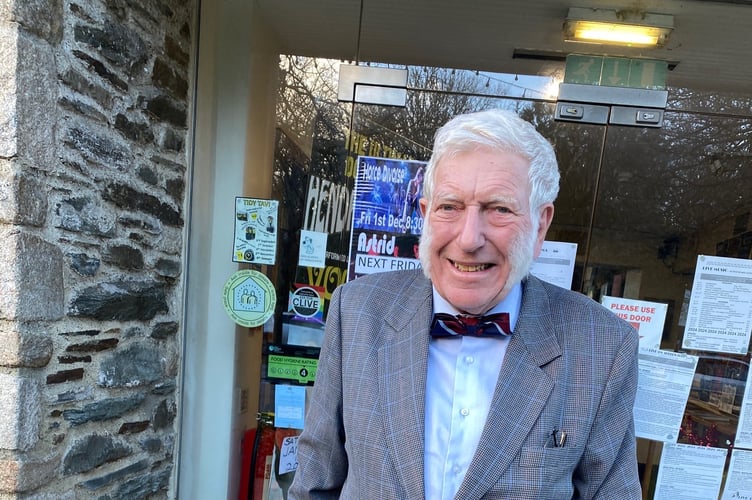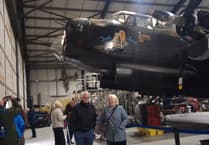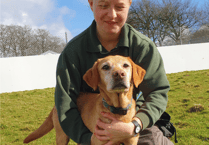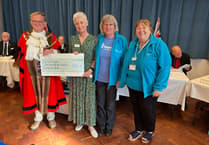A KEY figure in a crucial RAF bombing raid which helped British forces reclaim the Falklands from the Argentinian invaders has been telling of his experiences.
Baz Hamblyn was an ‘accidental hero’ of what at the time was the most ambitious long-distance ground attack raids since the WWII Dambusters.
The former RAF navigator gave an afternoon talk at the Tavistock Wharf on Monday (November 27). He told how the raids went ahead as planned with bombs dropped on Port Stanley airfield to prevent the enemy Argentinian air force using it for their fighter and bomber planes.
He was part of the team hurriedly, with just a week’s notice, assembled to plan the attacks by Vulcan bombers and refuelled in mid-air by Victor bombers over the Atlantic ocean far from land in 1982.
Baz admits to the meticulously planned refuelling schedule, which relied on a complex choreography of aircraft being refuelled at the right time with enough fuel to get them nearly 8,000 miles and 16-hours’ flying, did not go smoothly.
Operation Black Buck was renowned for its complexity with many potential hiccups on a raid that that has never been attempted at such a long distance. Bombers could not carry enough fuel to reach the Falklands without having to refuel from their Victor fuel tanker craft while still in the air several times via long hoses.The variables were equipment failure and unpredictable weather which could and did increase fuel consumption, potentially causing raids to be aborted or planes to crash or land far from home after attacks.
Baz said: “It all happened largely as planned with a big crater created at one end and other damage, which prevented the Argentinians lengthening the runway so their fast jets Pukara planes could use the extra length to take off with a heavy bomb load to hit our forces. But the full damage was not achieved.
“We also used missiles to hit their radars. But the logistics didn’t go to plan and all the things that could go wrong did, but despite this the operation did go ahead. I was proud to be part of it, even if it didn’t all go to plan.
“However, if it hadn’t been for our flight refuelling plan having contingency built in, then the bombing couldn’t have happened and planes would not have been able to reach home again.’’
The raids required more than the Vulcan numbers needed to drop bombs, because of the need to have reserve craft.
To add to the complexity, Victor tanker craft were needed to refuel the other tanker planes so they could go further and keep up with the Vulcans there and on their way back from the raids. A total of 11 tankers were needed to support two Vulcans (of which one Vulcan was a reserve).
Baz said: “Nothing like it had been attempted before and I was sent to convince a senior officer, the Air Marshal, that the refuel plane was viable and could work. Luckily for me he understood what was planned was vital for the raid to be successful.
“I flew to the Ascension Islands on a giant Hercules plane, from where the operation was being run. I shared the plane with a member of the SAS and his stock of armaments he was responsible for. Wow had to sit on these explosives when we picked up some other troops on the way after refuelling in Morocco. It was all being done in a rush because the Argentinians had invaded the Falklands with a surprise attack. I was the last to know out of my team when I arrived at my new base on RAF Marham to work with the Victor tanker planes and they had to break the shock news to me. But it was also exciting because it was what we’d all trained for.”
One of the flaws in the refuelling plan was that planning for any flights relied on weather forecasts. Any bad weather with strong winds which the planes had to battle against meant scaling back the bomb load to make planes lighter or reducing the distance flown. The latter was not possible in the case of the Falklands, so more refuelling was planned to counter this with more Victors available.
He said: “There was no data on Southern Hemisphere weather because this long distance op was unprecedented. So, we had to estimate the weather and wind, plus the weather at the time was terrible. In the end planes had only enough fuel to land back on Ascension and no further, so there was no room for problems.
“Because they had next to no fuel left, against all safety procedure, they were forced to all land one after the other as soon as they arrived back from the raids before each was cleared off the runway at Ascension.
“That could potentially have led to a crash on the runway. To add to the risks, we found out very late, was that the Vulcan handbooks, on which we based fuel needs, badly underestimated the amount of fuel needed in reality. It was a miracle it all worked out and is a testament the professionalism of everyone involved both on the ground and in the air.”
Baz Hamblyn, right, before giving his talk at Tavistock Wharf on Monday.





Comments
This article has no comments yet. Be the first to leave a comment.